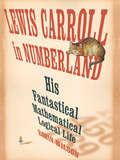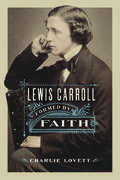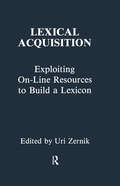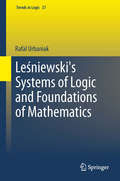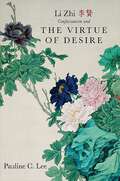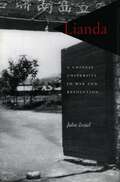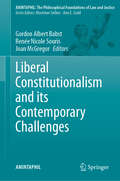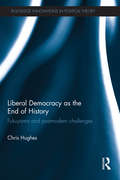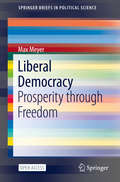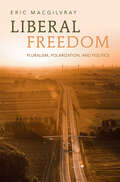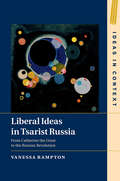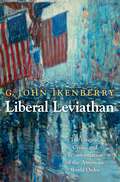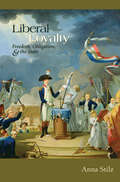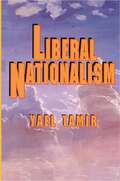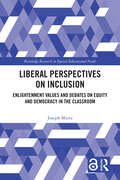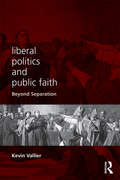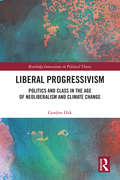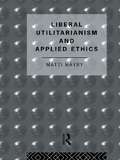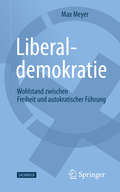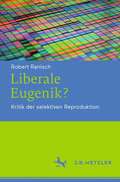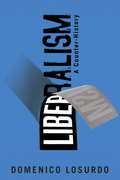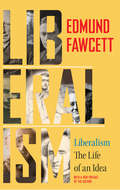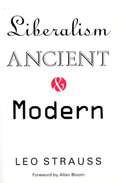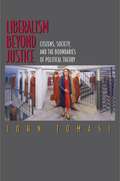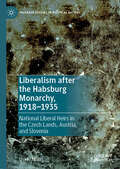- Table View
- List View
Lewis Carroll in Numberland: His Fantastical Mathematical Logical Life
by Robin Wilson"A fine mathematical biography."--John Allen Paulos, New York Times Book Review Just when we thought we knew everything about Lewis Carroll, here comes this "insightful . . . scholarly . . . serious" (John Butcher, American Scientist) biography that will appeal to Alice fans everywhere. Fascinated by the inner life of Charles Lutwidge Dodgson, Robin Wilson, a Carroll scholar and a noted mathematics professor, has produced this revelatory book--filled with more than one hundred striking and often playful illustrations--that examines the many inspirations and sources for Carroll's fantastical writings, mathematical and otherwise. As Wilson demonstrates, Carroll made significant contributions to subjects as varied as voting patterns and the design of tennis tournaments, in the process creating large numbers of imaginative recreational puzzles based on mathematical ideas.
Lewis Carroll: Formed by Faith
by Charlie LovettFor Lewis Carroll, a deacon in the Church of England, faith in Christ and belief in a loving God stood at the core of his being, but little has been written about what the church or faith meant to the celebrated author of the Alice books. With Lewis Carroll: Formed by Faith, Charlie Lovett provides the first in-depth study of the religious life of the famous author, whose real name was Charles Lutwidge Dodgson.By examining Dodgson’s religious education and core beliefs, this book shows how a deep Christian faith undergirded and guided every part of his life and work, from his relationships with children to his renowned writings, his work on logic, even his hobbies of photography and theatre going. The book includes a detailed account of the career of Dodgson’s father—an important figure in the Anglican church and a key influence on his son.Family records give insight into Charles’s early education, and newly discovered manuscript materials paint a full picture of his religious education at Richmond and Rugby Schools. Lovett finds previously unknown influences in Dodgson’s life, analyzes his habits of preaching and prayer, explores his training for confirmation and ordination, analyzes his reasons for eschewing the priesthood, and concludes with an account of his death and funeral and his logically constructed theology of the afterlife. The book makes use of previously untapped sources and highlights new material, including a previously unknown sermon by Dodgson, the first ever discovered. The result is a major contribution offering new perspectives on this creator of fantastical fiction and the spiritual bedrock that informed his life and imagination.
Lexical Acquisition: Exploiting On-line Resources To Build A Lexicon
by Uri ZernikOn-line information -- and free text in particular -- has emerged as a major, yet unexploited, resource available in raw form. Available, but not accessible. The lexicon provides the major key for enabling accessibility to on-line text. The expert contributors to this book explore the range of possibilities for the generation of extensive lexicons. In so doing, they investigate the use of existing on-line dictionaries and thesauri, and explain how lexicons can be acquired from the corpus -- the text under investigation -- itself. Leading researchers in four related fields offer the latest investigations: computational linguists cover the natural language processing aspect; statisticians point out the issues involved in the use of massive data; experts discuss the limitations of current technology; and lexicographers share their experience in the design of the traditional dictionaries.
Leśniewski's Systems of Logic and Foundations of Mathematics
by Rafal UrbaniakThis meticulous critical assessment of the ground-breaking work of philosopher Stanislaw Leśniewski focuses exclusively on primary texts and explores the full range of output by one of the master logicians of the Lvov-Warsaw school. The author's nuanced survey eschews secondary commentary, analyzing Leśniewski's core philosophical views and evaluating the formulations that were to have such a profound influence on the evolution of mathematical logic. One of the undisputed leaders of the cohort of brilliant logicians that congregated in Poland in the early twentieth century, Leśniewski was a guide and mentor to a generation of celebrated analytical philosophers (Alfred Tarski was his PhD student). His primary achievement was a system of foundational mathematical logic intended as an alternative to the Principia Mathematica of Alfred North Whitehead and Bertrand Russell. Its three strands--'protothetic', 'ontology', and 'mereology', are detailed in discrete sections of this volume, alongside a wealth other chapters grouped to provide the fullest possible coverage of Leśniewski's academic output. With material on his early philosophical views, his contributions to set theory and his work on nominalism and higher-order quantification, this book offers a uniquely expansive critical commentary on one of analytical philosophy's great pioneers.
Li Zhi, Confucianism, and the Virtue of Desire (SUNY series in Chinese Philosophy and Culture)
by Pauline C. LeeLi Zhi (1527–1602) was a bestselling author with a devoted readership. His biting, shrewd, and visionary writings with titles like A Book to Hide and A Book to Burn were both inspiring and inflammatory. Widely read from his own time to the present, Li Zhi has long been acknowledged as an important figure in Chinese cultural history. While he is esteemed as a stinging social critic and an impassioned writer, Li Zhi's ideas have been dismissed as lacking a deeper or constructive vision. Pauline C. Lee convincingly shows us otherwise. Situating Li Zhi within the highly charged world of the late-Ming culture of "feelings," Lee presents his slippery and unruly yet clear and robust ethical vision. Li Zhi is a Confucian thinker whose consuming concern is a powerful interior world of abundance, distinctive to each individual: the realm of the emotions. Critical to his ideal of the good life is the ability to express one's feelings well. In the work's conclusion, Lee brings Li Zhi's insights into conversation with contemporary philosophical debates about the role of feelings, an ethics of authenticity, and the virtue of desire.
Lianda
by John IsraelIn the summer of 1937, Japanese troops occupied the campuses of Beijing’s two leading universities, Beida and Qinghua, and reduced Nankai, in Tianjin, to rubble. These were China's leading institutions of higher learning, run by men educated in the West and committed to modern liberal education. The three universities first moved to Changsha, 900 miles southwest of Beijing, where they joined forces. But with the fall of Nanjing in mid-December, many students left to fight the Japanese, who soon began bombing Changsha. In February 1938, the 800 remaining students and faculty made the thousand-mile trek to Kunming, in China’s remote, mountainous southwest, where they formed the National Southwest Associated University (Lianda). In makeshift quarters, subject to sporadic bombing by the Japanese and shortages of food, books, and clothing, students and professors did their best to conduct a modern university. In the next eight years, many of China’s most prominent intellectuals taught or studied at Lianda. This book is the story of their lives and work under extraordinary conditions. Lianda’s wartime saga crystallized the experience of a generation of Chinese intellectuals, beginning with epic journeys, followed by years of privation and endurance, and concluding with politicization, polarization, and radicalization, as China moved from a war of resistance against a foreign foe to a civil war pitting brother against brother. The Lianda community, which had entered the war fiercely loyal to the government of Chiang Kai-shek, emerged in 1946 as a bastion of criticism of China’s ruling Guomindang party. Within three years, the majority of the Lianda community, now returned to its north China campuses in Beijing and Tianjin, was prepared to accept Communist rule. In addition to struggling for physical survival, Lianda’s faculty and students spent the war years striving to uphold a model of higher education in which modern universities, based in large part on the American model, sought to preserve liberal education, political autonomy, and academic freedom. Successful in the face of wartime privations, enemy air raids, and Guomindang pressure, Lianda’s constituent universities eventually succumbed to Communist control. By 1952, the Lianda ideal had been replaced with a politicized and technocratic model borrowed from the Soviet Union.
Liberal Constitutionalism and its Contemporary Challenges (AMINTAPHIL: The Philosophical Foundations of Law and Justice #12)
by Joan McGregor Gordon Albert Babst Renée Nicole SourisThe edited volume brings together contemporary work by philosophers, legal scholars, and political theorists. This volume presents relevant understandings of the common good, democracy, liberty, and law, and situates them in the context of contemporary countervailing pressures posed by issues in education, access to medical treatment in a pandemic, and the media. Motivated to ascertain how democracy is threatened by a variety contemporary challenges, the authors examine core aspects of law, representative democracy, and constitutionalism to shed light on worrisome contemporary phenomena such as social media-driven conspiracy theories, unequal access to education and medical treatment, among other topics.
Liberal Democracy as the End of History: Fukuyama and Postmodern Challenges (Routledge Innovations in Political Theory)
by Christopher HughesFrancis Fukuyama claims that liberal democracy is the end of history. This book provides a theoretical re-examination of this claim through postmodernist ideas. The book argues that postmodern ideas provide a valuable critique to Fukuyama’s thesis, and poses the questions: can we talk about a universal and teleological history; a universal human nature; or an autonomous individual? It addresses whether postmodern theories - concerning the movement of time, what it means to be human, and what it means to be an individual/subject - can be accommodated within a theory of a history that ends in liberal democracy. The author argues that incorporating elements of postmodern thought into Fukuyama’s theory makes it possible to produce a stronger and more compelling account of the theory that liberal democracy is the end of history. The result of this is to underpin Fukuyama’s theory with a more complex understanding of the movement of time, the human and the individual, and to show that postmodern concepts can, paradoxically, be used to strengthen Fukuyama’s theory that the end of history is liberal democracy. The book will be of interest to students and scholars of political theory, postmodernism and the work of Francis Fukuyama.
Liberal Democracy: Prosperity through Freedom (SpringerBriefs in Political Science)
by Max MeyerThis open access book aims to show which factors have been decisive in the rise of successful countries. Never before have so many people been so well off. However, prosperity is not a law of nature; it has to be worked for. A liberal economy stands at the forefront of this success – not as a political system, but as a set of economic rules promoting competition, which in turn leads to innovation, research and enormous productivity. Sustainable prosperity is built on a foundation of freedom, equal opportunity and a functioning government. This requires a stable democracy that cannot be defeated by an autocrat. Autocrats claim that “illiberalism” is more efficient, an assertion that justifies their own power. Although autocrats can efficiently guide the first steps out of poverty, once a certain level of prosperity has been achieved, people begin to demand a sense of well-being – freedom and codetermination. Only when this is possible will they feel comfortable, and progress will continue. Respect for human rights is crucial.The rules of the free market do not lean to either the right or left politically. Liberalism and the welfare state are not mutually exclusive. The “conflict” concerns the amount of government intervention. Should there be more or less?As a lawyer, entrepreneur, and board member with over 40 years of experience in this field of conflict, the author clearly describes the conditions necessary for a country to maintain its position at the top.
Liberal Freedom: Pluralism, Polarization, and Politics
by Eric MacGilvrayWe seem to be losing the ability to talk to each other about – and despite – our political differences. The liberal tradition, with its emphasis on open-mindedness, toleration, and inclusion, is ideally suited to respond to this challenge. Yet liberalism is often seen today as a barrier to constructive dialogue: narrowly focused on individual rights, indifferent to the communal sources of human well-being, and deeply implicated in structures of economic and social domination. This book provides a novel defense of liberalism that weaves together a commitment to republican self-government, an emphasis on the value of unregulated choice, and an appreciation of how hard it is to strike a balance between them. By treating freedom rather than justice as the central liberal value this important book, critical to the times, provides an indispensable resource for constructive dialogue in a time of political polarization.
Liberal Ideas in Tsarist Russia: From Catherine the Great to the Russian Revolution (Ideas in Context #126)
by Vanessa RamptonLiberalism is a critically important topic in the contemporary world as liberal values and institutions are in retreat in countries where they seemed relatively secure. Lucidly written and accessible, this book offers an important yet neglected Russian aspect to the history of political liberalism. Vanessa Rampton examines Russian engagement with liberal ideas during Russia's long nineteenth century, focusing on the high point of Russian liberalism from 1900 to 1914. It was then that a self-consciously liberal movement took shape, followed by the founding of the country's first liberal (Constitutional-Democratic or Kadet) party in 1905. For a brief, revelatory period, some Russians - an eclectic group of academics, politicians and public figures - drew on liberal ideas of Western origin to articulate a distinctively Russian liberal philosophy, shape their country's political landscape, and were themselves partly responsible for the tragic experience of 1905.
Liberal Leviathan: The Origins, Crisis, and Transformation of the American World Order (Princeton Studies in International History and Politics #141)
by G. John IkenberryA new vision for the American world orderIn the second half of the twentieth century, the United States engaged in the most ambitious and far-reaching liberal order building the world had yet seen. This liberal international order has been one of the most successful in history in providing security and prosperity to more people. But in the last decade, the American-led order has been troubled. Some argue that the Bush administration, with its war on terror, invasion of Iraq, and unilateral orientation, undermined this liberal order. Others argue that we are witnessing the end of the American era. Liberal Leviathan engages these debates.G. John Ikenberry argues that the crisis that besets the American-led order is a crisis of authority. A political struggle has been ignited over the distribution of roles, rights, and authority within the liberal international order. But the deeper logic of liberal order remains alive and well. The forces that have triggered this crisis—the rise of non-Western states such as China, contested norms of sovereignty, and the deepening of economic and security interdependence—have resulted from the successful functioning and expansion of the postwar liberal order, not its breakdown. The liberal international order has encountered crises in the past and evolved as a result. It will do so again.Ikenberry provides the most systematic statement yet about the theory and practice of the liberal international order, and a forceful message for policymakers, scholars, and general readers about why America must renegotiate its relationship with the rest of the world and pursue a more enlightened strategy—that of the liberal leviathan.
Liberal Loyalty: Freedom, Obligation, and the State
by Anna StilzMany political theorists today deny that citizenship can be defended on liberal grounds alone. Cosmopolitans claim that loyalty to a particular state is incompatible with universal liberal principles, which hold that we have equal duties of justice to persons everywhere, while nationalist theorists justify civic obligations only by reaching beyond liberal principles and invoking the importance of national culture. In Liberal Loyalty, Anna Stilz challenges both views by defending a distinctively liberal understanding of citizenship. Drawing on Kant, Rousseau, and Habermas, Stilz argues that we owe civic obligations to the state if it is sufficiently just, and that constitutionally enshrined principles of justice in themselves--rather than territory, common language, or shared culture--are grounds for obedience to our particular state and for democratic solidarity with our fellow citizens. She demonstrates that specifying what freedom and equality mean among a particular people requires their democratic participation together as a group. Justice, therefore, depends on the authority of the democratic state because there is no way equal freedom can be defined or guaranteed without it. Yet, as Stilz shows, this does not mean that each of us should entertain some vague loyalty to democracy in general. Citizens are politically obligated to their own state and to each other, because within their particular democracy they define and ultimately guarantee their own civil rights. Liberal Loyalty is a persuasive defense of citizenship on purely liberal grounds.
Liberal Nationalism (Studies in Moral, Political, and Legal Philosophy #47)
by Yael Tamir"This is a most timely, intelligent, well-written, and absorbing essay on a central and painful social and political problem of our time."—Isaiah Berlin"The major achievement of this remarkable book is a critical theory of nationalism, worked through historical and contemporary examples, explaining the value of national commitments and defining their moral limits. Tamir explores a set of problems that philosophers have been notably reluctant to take on, and leaves us all in her debt."—Michael WalzerIn this provocative work, Yael Tamir urges liberals not to surrender the concept of nationalism to conservative, chauvinist, or racist ideologies. In her view, liberalism, with its respect for personal autonomy, reflection, and choice, and nationalism, with its emphasis on belonging, loyalty, and solidarity, are not irreconcilable. Here she offers a new theory, "liberal nationalism," which allows each set of values to accommodate the other. Tamir sees nationalism as an affirmation of communal and cultural memberships and as a quest for recognition and self-respect. Persuasively she argues that national groups can enjoy these benefits through political arrangements other than the nation-state. While acknowledging that nationalism places members of national minorities at a disadvantage, Tamir offers guidelines for alleviating the problems involved, using examples from currents conflicts in the Middle East and Eastern Europe.Liberal Nationalism is an impressive attempt to tie together a wide range of issues often kept apart: personal autonomy, cultural membership, political obligations, particularity versus impartiality in moral duties, and global justice. Drawing on material from disparate fields—including political philosophy, ethics, law, and sociology—Tamir brings out important and previously unnoticed interconnections between them, offering a new perspective on the influence of nationalism on modern political philosophy.
Liberal Perspectives on Inclusion: Enlightenment Values and Debates on Equity and Democracy in the Classroom (Routledge Research in Special Educational Needs)
by Joseph MintzProviding a theoretical underpinning for the idea of inclusion within education, this book recognizes the fundamental role political values play in our understanding of inclusion in the classroom, providing a philosophical lens on the inherent tensions that exist within sociological perspectives on social justice, equity and diversity.Chapters address value tensions from the perspective of classical liberalism and the extent to which this can be reconciled with values pluralism and Berlin’s notions of negative and positive liberty. The book argues for a re-framing of inclusion as a process of negotiation between teachers, parents, children and young people which involves a recognition of the complex tradeoffs involved in working with difference in the classroom. These tensions are explored through a series of case studies of real-world dilemmas in the classroom, ultimately serving to highlight the ways in which varying political value positions, including liberalism, are inescapably embedded within the practice in education.Considering topics such as decolonization of the curriculum, freedom of speech and social justice, this seminal volume will be highly relevant for researchers, scholars and postgraduate students in the fields of inclusive education, special educational needs, philosophy of education, social justice and education and critical theory.
Liberal Politics and Public Faith: Beyond Separation
by Kevin VallierIn the eyes of many, liberalism requires the aggressive secularization of social institutions, especially public media and public schools. The unfortunate result is that many Americans have become alienated from the liberal tradition because they believe it threatens their most sacred forms of life. This was not always the case: in American history, the relation between liberalism and religion has often been one of mutual respect and support. In Liberal Politics and Public Faith: Beyond Separation, Kevin Vallier attempts to reestablish mutual respect by developing a liberal political theory that avoids the standard liberal hostility to religious voices in public life. He claims that the dominant form of academic liberalism, public reason liberalism, is far friendlier to religious influences in public life than either its proponents or detractors suppose. The best interpretation of public reason, convergence liberalism, rejects the much-derided "privatization" of religious belief, instead viewing religious contributions to politics as a resource for liberal political institutions. Many books reject privatization, Liberal Politics and Public Faith: Beyond Separation is unique in doing so on liberal grounds.
Liberal Progressivism: Politics and Class in the Age of Neoliberalism and Climate Change (Routledge Innovations in Political Theory)
by Gordon HakIn Liberal Progressivism, Gordon Hak makes the case for the value of theory and philosophy in understanding the day-to-day political realm of elections, politicians, scandals, fund-raising, and law-making. Running through the book is the big question of how political attitudes and actions are philosophically grounded: why do people believe what they do? Framed as a debate between liberal progressivism and the Marxist-informed left, and between liberal progressives and the non-university-educated working class, an informant named "Gord" is introduced. Drawing on his life experience he acts as a guide into the worlds of liberal progressivism, the non-university-educated working class, and the Marxist-informed intellectual-left modes of existence that he has personally experienced. In 11 chapters, the book presents an appreciation of nonbinary relationships, open-ended dialectics, complex systems and equilibrium theory, and the importance of emotions in political life. Through a transdisciplinary approach, the book delves into the interconnecting the worlds of politics, philosophy, anthropology, sociology, history, and epistemology to produce a celebration of political theory which deserves to be widely read by students, scholars and activists.
Liberal Utilitarianism and Applied Ethics (Social Ethics and Policy)
by Matti HayryLiberal Utilitarianism and Applied Ethics explores the foundations of early utilitarianism and, at the same time, the theoretical bases of social ethics and policy in modern Western welfare states. Matti Hayry sees the main reason for utilitarianism's growing disrepute among moral philosophers is that its principles cannot legitimately be extended to situations where the basic needs of the individuals involved are in conflict. He is able to formulate a solution to this fundamental problem by arguing convincingly that by combining a limited version of liberal utilitarianism and the methods of applied ethics, we are able to define our moral duties and rights. Liberal Utilitarianism and Applied Ethics will appeal to students and teachers of philosophy who are interested in the doctrine of utilitarianism or in ethical decison-making.
Liberaldemokratie: Wohlstand zwischen Freiheit und autokratischer Führung
by Max MeyerNoch nie ging es so vielen Menschen so gut. Wohlstand ist aber kein Naturgesetz, er muss erarbeitet werden. Dieses Buch will aufzeigen, welche Faktoren für den Aufstieg erfolgreicher Länder entscheidend waren. Im Vordergrund steht dabei eine liberale Wirtschaft – nicht als politisches System, sondern in Form wirtschaftlicher Spielregeln. Die Spielregeln des freien Marktes stehen politisch weder rechts noch links, denn Liberalismus und Sozialstaat sind keine Gegensätze. Das Fundament nachhaltiger Prosperität bilden Freiheit, Chancengleichheit und ein funktionierender Staat. Bedingung dafür ist eine stabile Demokratie, die nicht von einem Autokraten infrage gestellt werden kann. Zwar können erste Schritte aus der Armut autokratisch effizient erfolgen. Sobald jedoch ein gewisser Wohlstand erreicht ist, verlangen die Menschen nach Wohlbefinden – also nach Freiheit und Mitbestimmung. Nur so treiben sie die Entwicklung weiter voran. Die Beachtung der Menschenrechte ist daher entscheidend. Mit über 40 Jahren Erfahrung als Anwalt, Unternehmer und Verwaltungsrat schildert der Autor dieses Buches in klaren Worten, unter welchen Voraussetzungen der Wohlstand eines Landes nachhaltig gesichert werden kann.
Liberale Eugenik?: Kritik der selektiven Reproduktion
by Robert RanischAnwendungen der Gendiagnostik und Reproduktionsmedizin erlauben es Wunscheltern, immer weiter auf das Erbgut ihrer Nachkommen Einfluss zu nehmen. Eine solche „liberale Eugenik“ wird mittlerweile auch in der Philosophie und Bioethik befürwortet. Wo liegen aber die Ursprünge eines solchen Denkens und wie ist eine umfassende Fortpflanzungsfreiheit zu bewerten? Ausgehend von einer freiheitlichen Ethik leistet die Studie eine immanente Kritik an der liberalen Eugenik und entwirft dabei eine eigene Position zum Umgang mit neuen gentechnischen Möglichkeiten.
Liberalism
by Gregory Elliott Domenico LosurdoIn this definitive historical investigation, Italian author and philosopher Domenico Losurdo argues that from the outset liberalism, as a philosophical position and ideology, has been bound up with the most illiberal of policies: slavery, colonialism, genocide, racism and snobbery.Narrating an intellectual history running from the eighteenth through to the twentieth centuries, Losurdo examines the thought of preeminent liberal writers such as Locke, Burke, Tocqueville, Constant, Bentham, and Sieyès, revealing the inner contradictions of an intellectual position that has exercised a formative influence on today's politics. Among the dominant strains of liberalism, he discerns the counter-currents of more radical positions, lost in the constitution of the modern world order.
Liberalism
by Edmund FawcettLiberalism dominates today's politics just as it decisively shaped the past two hundred years of American and European history. Yet there is striking disagreement about what liberalism really means and how it arose. In this engrossing history of liberalism--the first in English for many decades--veteran political observer Edmund Fawcett traces the ideals, successes, and failures of this central political tradition through the lives and ideas of a rich cast of European and American thinkers and politicians, from the early nineteenth century to today.Using a broad idea of liberalism, the book discusses celebrated thinkers from Constant and Mill to Berlin, Hayek, and Rawls, as well as more neglected figures. Its twentieth-century politicians include Franklin D. Roosevelt, Lyndon Johnson, and Willy Brandt, but also Hoover, Reagan, and Kohl. The story tracks political liberalism from its beginnings in the 1830s to its long, grudging compromise with democracy, through a golden age after 1945 to the present mood of challenge and doubt.Focusing on the United States, Britain, France, and Germany, the book traces how the distinct traditions of these countries converged on the practice of liberal democracy. Although liberalism has many currents, Fawcett suggests that they are held together by shared commitments: resistance to power, faith in social progress, respect for people's chosen enterprises and beliefs, and acceptance that interests and faiths will always conflict.An enlightening account of a vulnerable but critically important political creed, Liberalism will be a revelation for readers who think they already know--for good or ill--what liberalism is.
Liberalism Ancient And Modern
by Leo StraussRevered and reviled, Leo Strauss has left a rich legacy of work that continues to spark discussion and controversy. This volume of essays ranges over critical themes that define Strauss's thought: the tension between reason and revelation in the Western tradition, the philsophical roots of liberal democracy, and especially the conflicting yet complementary relationship between ancient and modern liberalism. For those seeking to become acquainted with this provocative thinker, one need look no further.
Liberalism Beyond Justice: Citizens, Society, and the Boundaries of Political Theory
by John TomasiLiberal regimes shape the ethical outlooks of their citizens, relentlessly influencing their most personal commitments over time. On such issues as abortion, homosexuality, and women's rights, many religious Americans feel pulled between their personal beliefs and their need, as good citizens, to support individual rights. These circumstances, argues John Tomasi, raise new and pressing questions: Is liberalism as successful as it hopes in avoiding the imposition of a single ethical doctrine on all of society? If liberals cannot prevent the spillover of public values into nonpublic domains, how accommodating of diversity can a liberal regime actually be? To what degree can a liberal society be a home even to the people whose viewpoints it was formally designed to include? To meet these questions, Tomasi argues, the boundaries of political liberal theorizing must be redrawn. Political liberalism involves more than an account of justified state coercion and the norms of democratic deliberation. Political liberalism also implies a distinctive account of nonpublic social life, one in which successful human lives must be built across the interface of personal and public values. Tomasi proposes a theory of liberal nonpublic life. To live up to their own deepest commitments to toleration and mutual respect, liberals, he insists, must now rethink their conceptions of social justice, civic education, and citizenship itself. The result is a fresh look at liberal theory and what it means for a liberal society to function well.
Liberalism after the Habsburg Monarchy, 1918–1935: National Liberal Heirs in the Czech Lands, Austria, and Slovenia (Palgrave Studies in Political History)
by Oskar MulejThis book explores what it meant to be ‘liberal ’ in interwar Czech, Austrian, and Slovenian politics. Up until 1918, these countries shared the common political framework of Cisleithania (the Austrian part of the Habsburg Monarchy). Within this framework was the predominantly pejorative function of the label ‘liberal,’ and as a result after 1918, no major political party employed it to describe its own political orientation. Despite making considerable efforts to dissociate themselves from liberalism, many parties continued to be referred to as ‘liberal ’ by the contemporary public. This association with liberalism, the book argues, was primarily due to the parties’ historical background rather than any ideological commitment to liberalism, and for that reason, the author refers to them as ‘national liberal heirs.’ Examining the (dis)continuities of liberal party traditions, the book presents three representative cases of national liberal heirs: the Czechoslovak National Democracy; the Greater German People’s Party; and the Slovenian sections of the Yugoslav Democratic Party, the Independent Democratic Party, and the Yugoslav National Party. Forming a distinctive part of early twentieth-century party landscapes in Central Europe, the national liberal heirs had inherited organisational structures, parts of electorate, as well as rootedness in specific cultural and social milieus from their liberal predecessors. Following the political trajectories of the national liberal heirs, the author seeks to answer in which spheres, in which manners, and to what extent liberalism survived or even continued to develop in the interwar Czech lands, Austria, and Slovenia.
